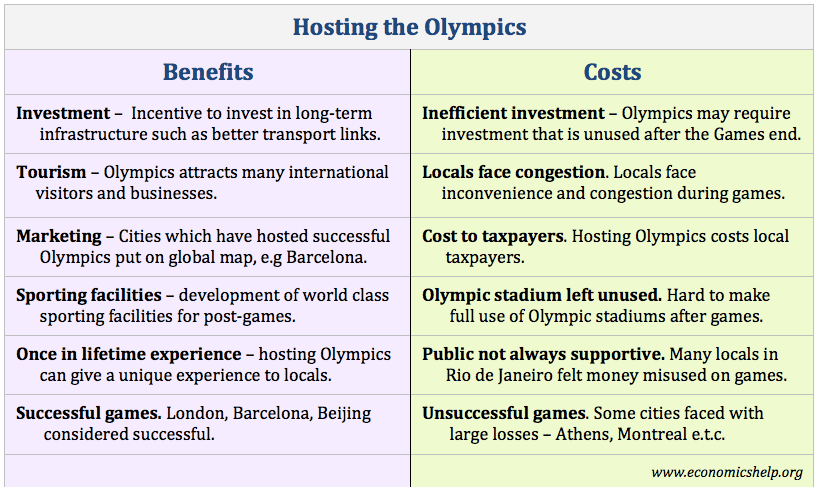
Readers Question: Evaluate the arguments for and against the view that major sports events are good for the economy?
Major sports events such as the World Cup and the Olympics are often seen as a potential source of economic regeneration. Yet, many are worried about the economic costs of hosting a major sporting event that only lasts for three weeks. These are some of the economic benefits and potential costs of the Olympics and other major sporting events.
Economic benefits of the Olympics
1. Encourages investment in transport and infrastructure
Major sporting events usually require upgrades to transport and communication links. This investment leaves a lasting legacy for the whole economy. Better transport links reduce congestion and help to improve efficiency for local business. It can help increase the productive capacity of the economy (shifting aggregate supply to the right). For example, for the London Olympics in 2012, we have seen new rail links created in East London, and improvements to existing underground and overground train services (London Olympic rail networks)
2. Influx of foreign visitors
A major sporting event like the Olympics can attract thousands of people for the duration of the games. These foreign tourists bring a boost to the local economy. In particular the local tourist trade, shops/hotels will benefit from the surge in visitor numbers. However, it is worth noting that these visitor numbers tend to be temporary. The major sporting event only lasts for a few weeks; potentially there could be many empty hotel beds in the future. On the other hand, people argue a major sporting event can lead to a long-term growth in visitor numbers. e.g. China felt the Beijing Olympics created a feeling that China could be a popular tourist destination. Barcelona saw higher visitor numbers continue after the Barcelona Olympics of 1992.
3. Job creation
Typically, major sporting events require investment in building stadium and hotels. This creates jobs for the local economy for up to 4 years before the event. These extra jobs help create a positive multiplier effect within the local economy. It is hoped that the London Olympics will help regenerate the east end of London. Some argue this temporary job boost can prove more permanent if the economic regeneration continues after the games.
4. Higher economic growth
It is estimated that the ‘Olympics Effect’ leads to a boost in economic growth due to the higher investment and foreign visitors. This leads to higher tax revenues for the government
Costs of events like the Olympics
1. Expense
The cost of hosting a major sporting event has increased significantly in recent years. It includes, not only, all the investment but also the heightened security. It is hard to meet these costs through sponsorship and ticket sales alone. Therefore, it can lead to higher taxes for the local population. In cases like Montreal and Athens, the cost has been a very significant burden on the local economy.
The Montreal Olympics was estimated to have cost $120 million (1970) – then rising to an estimated $310 million (1973). The final cost was around 13-times greater at $1.6bn. It took 30 years to pay off the Olympic debt [2].
2. Will the infrastructure be used in the future?
The Olympics requires a lot of investment, which may not necessarily be used in the future. Many custom built sporting events may not be used in the future. If they are not used, then it is an inefficient use of resources. Taxpayers will pay for the cost of building but will get a poor return in terms of improved public services.
3. Disruption during the event
It is feared that during the Olympics there will be a disruption to local businesses not affected. For example, increased security features make it more difficult to continue normal business.
4. Opportunity cost
Local taxpayers are not always supportive because they feel that there are better alternatives to spending public money on the Olympic stadium. For example, building social housing, improving the environment and improved transport.
5. Local business squeezed out by contracts with multinational sponsors
The Olympics is partly financed by large marketing budgets of multinationals, such as Coca-Cola, Visa, Samsung and others. However, the advertising comes with strict rules about monopoly privileges associated with the Olympics. Local business can be banned from mentioning the Olympics; there is no scope for local suppliers to be involved.
Evaluation
- It depends on how much investment is required in the first place. e.g. do all stadiums need to be built? can the stadiums and facilities be effectively used after the games?
- Can firms keep to initial cost estimates? (e.g. New Wembley was much more expensive than first predicted)
- Some sectors of the economy benefit much more than others. Good for tourism and hotel owners, but locals may feel they have more disruption.
- The host city may benefit the most, but the cost spread across the country, which doesn’t see the same benefits.
Further reading


By the way this helped me with my research paper at the University of Kansas in Lawerance, KS
This helped me through high school
Here in Canada, where the obscenely expensive 2010 party called the Winter Games is in full swing, it’s clear that this is all about money and partying (with athletic achievement a much-ballyhooed but less important factor – that’s why each sport has its own world championship).
And Vancouverites will continue to pay for these Games long after the drunken fans have returned home after 17 days. According to economist Dr. Jeffrey Owen at Indiana State University, it’s a myth that hosting an Olympics event makes good business sense, despite what all those economic impact studies predict.
“To date, there has not been a single study of an Olympics or other large-scale sporting event that has found empirical evidence of significant economic impacts.”
More on this at: ‘Why the Olympics Are Bad Business’ at
http://ethicalnag.org/2010/02/14/olympics/
this website is really good
These are really true…Here in South Africa, I’ve seen lots of positives about hosting a major sporting event but also negatives. Its much like business though, If you are willing to gamble (take a risk), you might find yourself reaping really good fruits in future (in terms of investments-fdi)
This website was very helpful for our business presentation. R.I.P James Walton
thanks from al – islamyia school you help my thank you
Thank you so much, this has helped me get my A* in A-level economics. Short and brief which is essentail for my criteria. cheers.
That’s great! I agree, it’s helpful info…I hope it helps me get an A* on my Travel and Tourism assignment.
I hope it helps me get an A* in my Travel and Tourism Paper as well.
talk about london sports can anybody help to write these please
Thanks, this website really helped me to write about the costs of the olympics!
This information is extremely useful. Thanks.